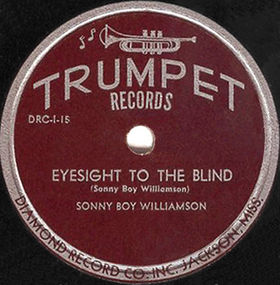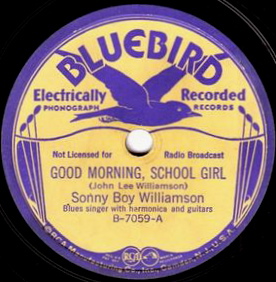Related Research Articles

Alex or Aleck Miller, known later in his career as Sonny Boy Williamson, was an American blues harmonica player, singer and songwriter. He was an early and influential blues harp stylist who recorded successfully in the 1950s and 1960s. Miller used various names, including Rice Miller and Little Boy Blue, before calling himself Sonny Boy Williamson, which was also the name of a popular Chicago blues singer and harmonica player. To distinguish the two, Miller has been referred to as Sonny Boy Williamson II.

Marion Walter Jacobs, known as Little Walter, was an American blues musician, singer, and songwriter, whose revolutionary approach to the harmonica had a strong impact on succeeding generations, earning him comparisons to such seminal artists as Django Reinhardt, Charlie Parker and Jimi Hendrix. His virtuosity and musical innovations fundamentally altered many listeners' expectations of what was possible on blues harmonica. He was inducted into The Rock and Roll Hall of Fame in 2008, the first and, to date, only artist to be inducted specifically as a harmonica player.

John Lee Curtis "Sonny Boy" Williamson was an American blues harmonica player, singer and songwriter. He is often regarded as the pioneer of the blues harp as a solo instrument. He played on hundreds of recordings by many pre–World War II blues artists. Under his own name, he was one of the most recorded blues musicians of the 1930s and 1940s and is closely associated with Chicago producer Lester Melrose and Bluebird Records. His popular songs, original or adapted, include "Good Morning, School Girl", "Sugar Mama", "Early in the Morning", and "Stop Breaking Down".

Junior Wells was an American singer, harmonica player, and recording artist. He is best known for his signature song "Messin' with the Kid" and his 1965 album Hoodoo Man Blues, described by the critic Bill Dahl as "one of the truly classic blues albums of the 1960s". Wells himself categorized his music as rhythm and blues.

Homesick James was an American blues musician known for his mastery of the slide guitar. He worked with his cousin, Elmore James, and with Sonny Boy Williamson II.

"Eyesight to the Blind" is a 12-bar blues song written and recorded in 1951 by Sonny Boy Williamson II. He also recorded the related songs "Born Blind", "Unseeing Eye", "Don't Lose Your Eye", and "Unseen Eye" during his career. The Larks, an American rhythm and blues group, recorded the song, which reached number five on the R&B charts in 1951. Several musicians subsequently recorded it in a variety of styles. The Who adapted Williamson's song for their rock opera Tommy.

Edward Riley Boyd was an American blues pianist, singer and songwriter, best known for his recordings in the early 1950s, including the number one R&B chart hit "Five Long Years".

"Stop Breaking Down" or "Stop Breakin' Down Blues" is a Delta blues song recorded by Robert Johnson in 1937. An "upbeat boogie with a strong chorus line", the lyrics are partly based on Johnson's experience with certain women:

"Dust My Broom" is a blues song originally recorded as "I Believe I'll Dust My Broom" by American blues artist Robert Johnson in 1936. It is a solo performance in the Delta blues-style with Johnson's vocal accompanied by his acoustic guitar. As with many of his songs, it is based on earlier blues songs, the earliest of which has been identified as "I Believe I'll Make a Change", recorded by the Sparks brothers as "Pinetop and Lindberg" in 1932. Johnson's guitar work features an early use of a boogie rhythm pattern, which is seen as a major innovation, as well as a repeating triplets figure.
"One Way Out" is a blues song that was recorded in the early 1960s by both Sonny Boy Williamson II and Elmore James. A reworking of the song by G. L. Crockett, titled "It's a Man Down Here", appeared on the Billboard record charts in 1965. In 1971, the Allman Brothers Band recorded an updated live version of the song, which was included on their popular Eat a Peach album (1972).

"Worried Life Blues" is a blues standard and one of the most recorded blues songs of all time. Originally recorded by Big Maceo Merriweather in 1941, "Worried Life Blues" was an early blues hit and Maceo's most recognized song. An earlier song inspired it and several artists have had record chart successes with their interpretations of the song.

Lafayette Leake was an American blues and jazz pianist, organist, vocalist and composer who played for Chess Records as a session musician, and as a member of the Big Three Trio, during the formative years of Chicago blues. He played piano on many of Chuck Berry's recordings.

"Good Morning, School Girl" is a blues standard that has been identified as an influential part of the blues canon. Pre-war Chicago blues vocalist and harmonica pioneer John Lee "Sonny Boy" Williamson first recorded it in 1937. Subsequently, a variety of artists have recorded versions of the song, usually calling it "Good Morning Little Schoolgirl".
"Baby Face" Leroy Foster was an American blues singer, drummer and guitarist, active in Chicago from the mid-1940s until the late 1950s. He was a significant figure in the development of the postwar electric Chicago blues sound, particularly as a member of the Muddy Waters band during its formative years.

"It Hurts Me Too" is a blues standard that is "one of the most interpreted blues [songs]". First recorded in 1940 by Tampa Red, the song is a mid-tempo eight-bar blues that features slide guitar. It borrows from earlier blues songs and has been recorded by many artists.

"Look on Yonder Wall" is a blues song first recorded in 1945 by James "Beale Street" Clark. Clark, also known as "Memphis Jimmy", was a blues pianist from Memphis, Tennessee. During the 1940s, he appeared on recordings by Jazz Gillum, Red Nelson, and an early Muddy Waters session, as well as several singles in his own name.
"Checkin' Up on My Baby" is a song recorded by Sonny Boy Williamson II in 1960 that has become a classic of the blues. The song was not released as a single, but was included on Williamson's The Real Folk Blues album released after his death in 1965. The song has been recorded by numerous blues and other artists, making it one of Williamson's most recorded songs.
"Sugar Mama" or "Sugar Mama Blues" is a blues standard. Called a "tautly powerful slow blues" by music journalist Charles Shaar Murray, it has been recorded by numerous artists, including early Chicago bluesmen Tampa Red, Sonny Boy Williamson I, and Tommy McClennan. John Lee Hooker and Howlin' Wolf later adapted "Sugar Mama" for electric blues and rock group Led Zeppelin reworked it during early recording sessions.

"Early in the Mornin'" or "'Early in the Morning" is a song that was recorded by Louis Jordan and His Tympany Five in 1947. It is an early example of a blues which incorporates Afro-Cuban rhythms and percussive instruments. "Early in the Mornin'" became a hit, reaching number three in Billboard magazine's race records chart.

"Bottle Up and Go" or "Bottle It Up and Go" is a song that is a standard of the blues. Based on earlier songs, Delta bluesman Tommy McClennan recorded "Bottle It Up and Go" in 1939. The song has been interpreted and recorded by numerous artists, sometimes using alternate titles, such as "Step It Up and Go", "Shake It Up and Go", etc.
References
- 1 2 Inaba, Miysutoshi (2016). John Lee "Sonny Boy": The Blues Harmonica of Chicago's Bronzeville. Lanham, Maryland: Rowman & Littlefield. pp. 36–37. ISBN 978-1442254428.
- ↑ Owens, Thom. "Charlie Spand: The Complete Paramounts (1929-1931) –Review". AllMusic . Retrieved June 29, 2021.
- ↑ Early versions include Big Bill Broonzy as "At the Break of Day" (1934, Bluebird Records 5571); Walter Roland as "Early This Morning" (1934, Banner Records 33343); Jimmie Gordon as "Soon in the Morning" (1935, Decca Records 7099); Bill Gaither as "Bout the Break of Day" (1936, Decca 7404 as "Leroy's Buddy"); Speckled Red as "Early in the Morning" (1938, Bluebird 8069); and Washboard Sam as "So Early in the Morning" (1939, Bluebird 8358). Inaba (2016) pp. 37–38.
- ↑ Balfour, Alan (1992). Complete Recorded Works in Chronological Order, Volume 1 (19 June 1928 to 19 March 1929) (CD notes). Leroy Carr. Document Records. DOCD-5134. Retrieved January 10, 2016.
- 1 2 Herzhaft, Gerard (1992). "Early in the Morning". Encyclopedia of the Blues. Fayetteville, Arkansas: University of Arkansas Press. p. 446. ISBN 1-55728-252-8.
- 1 2 Fancourt, Les (1995). Sugar Mama – The Essential Recordings of Sonny Boy Williamson (Album notes). Sonny Boy Williamson I. Indigo Records. pp. 2–3. IGOCD 2014.
- ↑ Dahl, Bill (1996). "Sonny Boy Williamson [I]". In Erlewine, Michael (ed.). All Music Guide to the Blues . San Francisco: Miller Freeman Books. p. 283. ISBN 0-87930-424-3.
- ↑ Labinsky, Daria (2014). "Sonny Boy Williamson". In Stacy, Lee; Henderson, Lol (eds.). Encyclopedia of Music in the 20th Century. New York City: Routledge. p. 673. ISBN 978-1135929466.
- ↑ Komara, Edward, ed. (2006). "Williamson, Sonny Boy I (John Lee Williamson)". Encyclopedia of the Blues. New York City: Routledge. p. 1086. ISBN 978-0-415-92699-7.
- ↑ Whitburn (1988), p. 7.
- ↑ Whitburn, Joel (1988). Top R&B Singles 1942–1988. Menomonee Falls, Wisconsin: Record Research. p. 447. ISBN 0-89820-068-7.
- 1 2 Koester, Bob (1998). Blues Hit Big Town (Album notes). Junior Wells. Chicago: Delmark Records. p. 2. DD-640.
- ↑ Vickers, Tom (1998). Best of the Vanguard Years (Album notes). Junior Wells. Santa Monica, California: Vanguard Records. p. 5. 79508-2.
- ↑ Koester, Bob (1965). Hoodoo Man Blues (Liner notes). Junior Wells. Chicago: Delmark Records. Back cover. DD-612.
- ↑ "Junior Wells, Pioneering Blues Harmonica Player, Succumbs at 63". Jet . Vol. 93, no. 10. Chicago. February 2, 1998. p. 18. ISSN 0021-5996.
- ↑ Whitburn (1988), p. 438.